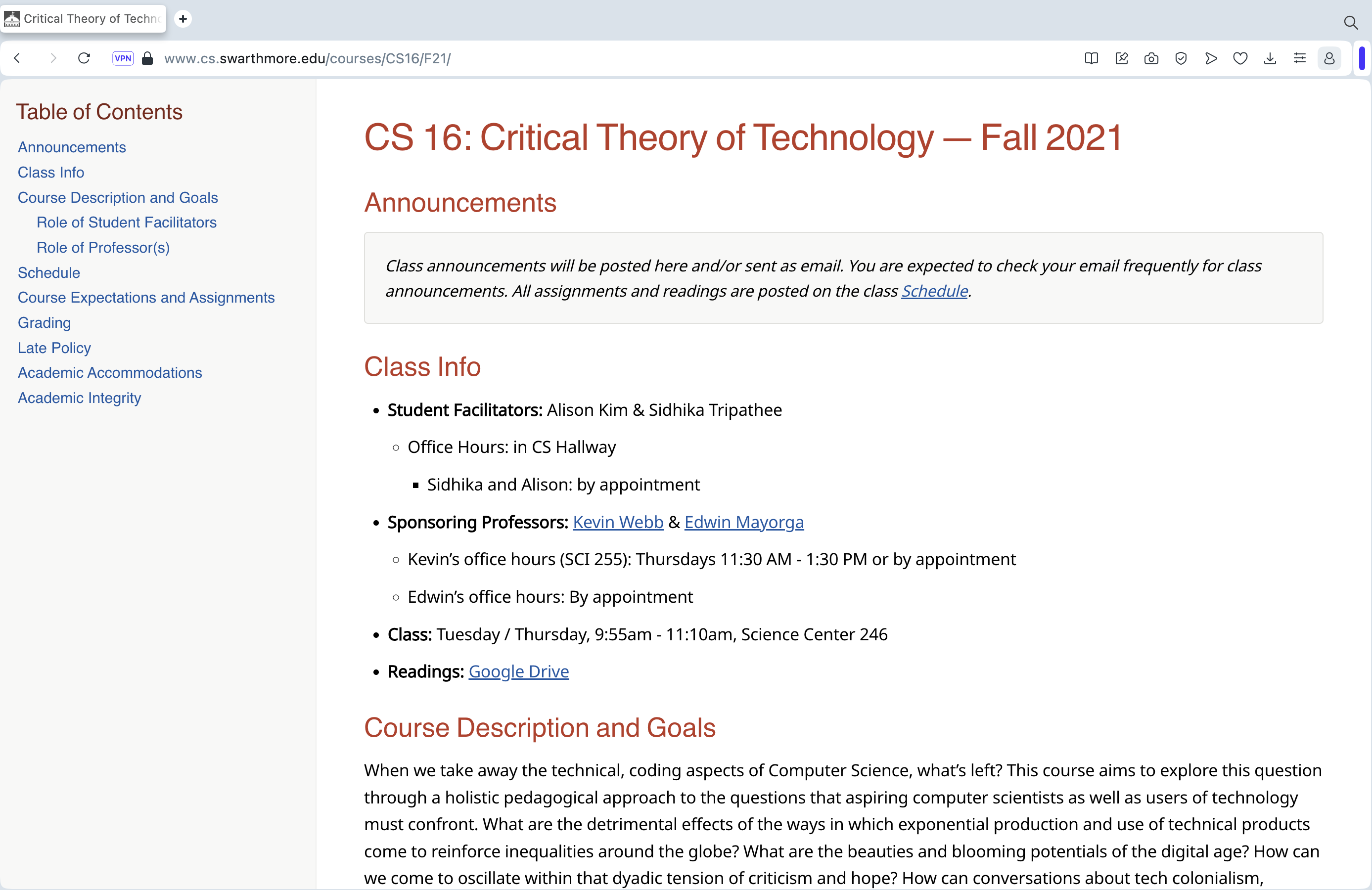Sidhika Tripathee ‘22 and I first connected through the student club Tech for Social Good, where we developed a common goal of leveraging our school’s student-led course program to teach about technology’s implications on society, especially its perpetuation of injustices. During the spring semester of my sophomore year, I undertook a directed reading with Professor of Educational Studies Edwin Mayorga (who later became one of the course’s faculty sponsors), where I curated and studied the materials that would form the core of our curriculum. Over the summer, I worked with Sidhika and our other faculty sponsor, Professor of Computer Science Kevin Webb, to finalize the course. CS16: Critical Theory of Technology was successfully launched the following fall semester.
CS 16: Critical Theory of Technology, offered in Fall semester of 2021, was a student-led course designed to challenge traditional curriculum of computer science by centering social theory as the primary source of study. One of the unique aspects of this course was its structure, which emphasized student agency and collaborative learning. The student facilitators were responsible for designing the syllabus, leading discussions, and organizing activities, while the professors provided guidance and support as needed. Led by myself and Sidhika and sponsored by Computer Science professor Kevin Webb and Educational Studies professor Edwin Mayorga, this course aimed to explore the intersection of social theory and technology, leaning heavily into the discipline of Science Technology Studies. The course created a space for students to critically examine the trajectory and implications of technology, exploring how technology conveys significance beyond its functional design, as a lens to understand broader societal issues. By incorporating trauma-informed pedagogy and encouraging students to integrate their personal experiences and connections with the course topics, the curriculum provides opportunities for students to reflect on their learning processes and the broader implications of their studies. This approach empowered students to take ownership of their education and explore subjects that resonate with their interests and experiences.
The curriculum covered a broad range of interdisciplinary topics: including tech colonialism, disability theory, critical race theory, and gender and queer theory, that provided a comprehensive and nuanced examination of the multifaceted relationship between technology and society. The curriculum encouraged students to engage with these texts through discussions and written assignments. The discussions are enriched by guest lectures, who joined the class during the week that aligned with their area of expertise, including Professor of Philosophy Peter Baumann, Professor of Disability and Gender and Sexuality studies Madalina Meirosu, Professor of Religion James Padilioni,Professors of Computer Science Lila Fontes and Ben Mitchell, Professor of History Timothy Burke, Professor of Environmental Studies Adrienne Benally, and University of Washington PhD candidate Os Keyes who brought additional expertise and insights to the classroom.
The course began with an exploration of multicultural dynamics and the transformative possibilities of learning theory, featuring seminal works by Chandra Mohanty and bell hooks. This set the stage for subsequent discussions on justice-centered approaches in computer science education, with readings by Sepehr Vakil and Randy Connolly that highlighted the intersection of ethics, identity, and political vision in educational practices. The course progressed into the philosophical and historical perspectives on technology, drawing on the influential ideas of Langdon Winner and Martin Heidegger. The following week explored how technology affects and is affected by social constructions of disability, challenging students to consider how technological advancements intersect with issues of disability. The curriculum then shifted to critical examinations of gender and queer theory in technology, featuring foundational texts by Monique Wittig, Audre Lorde, and Donna Haraway, and followed that with discussions on ethics in computer science, with contributions from James Moor and Paul Scharre. Afterwards, concepts of tech colonialism and postcolonial technoscience were introduced, guided by readings from Edward Said, Eve Tuck, and Shoshana Zuboff, which illuminated the ongoing impacts of colonialism and surveillance in the digital epoch. Finally, the course addressed critical race theory and algorithmic bias, drawing on the insights of Ruha Benjamin and Dorothy Roberts, and concluded with an examination of tech orientalism.
The importance of this course lay in its ability to bridge the gap between technical knowledge and critical analysis. Through its interdisciplinary and reflective approach, students had the space to navigate and critically engage with the complex landscape of technology as well as the impact of technological advancements on global inequalities. This course became one of my proudest achievements in school, and I am so grateful for Sidhika, Kevin, Edwin, the guest speakers, the students who participated in the course, and others who encouraged and supported me for this experience.
